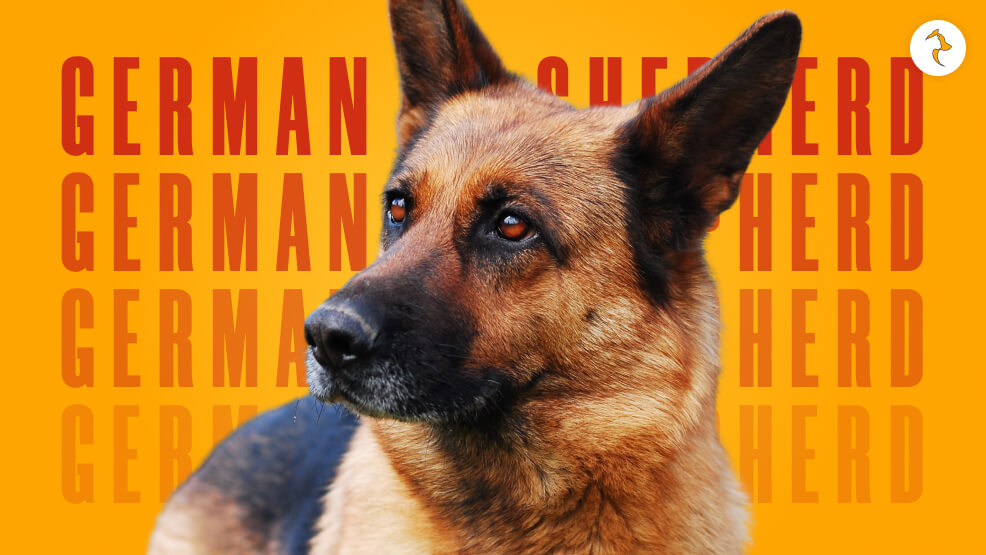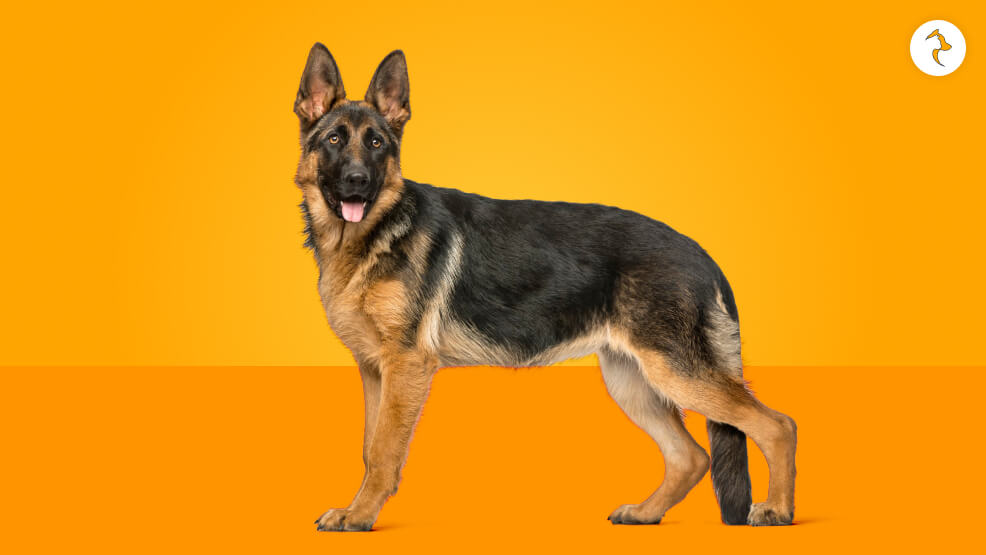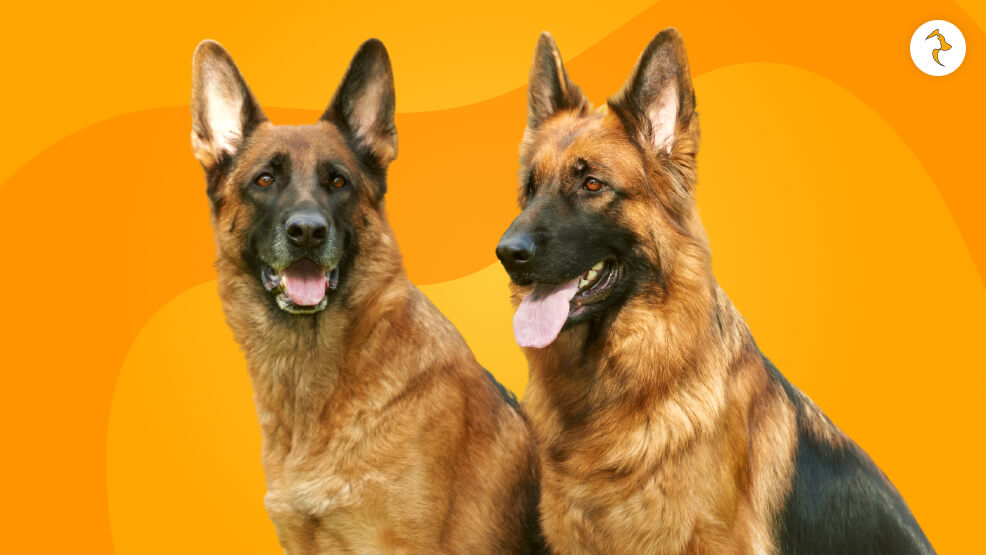German Shepherd Growth Chart: All You Need To Know


German Shepherds are a large breed of dogs. The German Shepherd growth chart depends on two critical factors – genetics and the environment determine how big your total grown German shepherd will be. Monitoring your german shepherd weight chart will help you keep track of any health risks like hip dysplasia.
All German Shepherd dog owners know that males weigh between 66-88 pounds and females weigh between 49-71 pounds. This tremendous weight is average considering the height of these dogs, which ranges between 24-26 inches for adult males and 22-24 inches for adult females.
If you do not have much information on the German shepherd puppy growth chart, you have come to the right place! So without wasting any time, keep reading to find out all you need to know about an excellent German shepherd growth chart to track your favorite pet’s health.
German Shepherd Growth Chart: Fun Facts

Are you planning to adopt a German Shepherd puppy, or are you already a proud parent of one? Whatever the case, maybe knowing more about your dog’s breed always helps monitor your personal German Shepherd growth chart. This breed’s trainability and loyalty have made it a modern dog breed.
Here are some fun facts about a full-grown German Shepherd for you to know your pet better.
1. There Are Five Different Types Of German Shepherd Dogs
Despite owning German Shepherd puppies, many people are unaware that there are five different German Shepherd dogs. The five different types are,
- American Show Line German Shepherds
- West Show Line German Shepherds
- West Working Line German Shepherds
- East Working-Line DDR German Shepherds
- Czech Working Line German Shepherds.
2. Originally Developed As A Herding Breed
Captain Max Von Stephanitz initially developed German Shepherds. Initially, this breed was created as a herding breed before being appropriated by militants.
In addition to this, German Shepherds can be trained quickly and are incredibly loyal creatures. As a result, this breed has a top spot in the American Kennel Club’s list of most popular breeds of dogs.
3. German Shepherds Are A Large Breed
A German Shepherd puppy growth chart, largely depends upon the size of the concerned dog’s parents. Remember that a dog is always measured from their shoulders because a more consistent reading is possible. When you type German Shepherd weight on Google, you will find these dogs weigh around 36-40 kilograms (for males) and 29-31 kilograms (for females).
4. German Shepherds Stop Growing When They Are Between 18 Months – 3 Years Old
Are you constantly thinking, ‘ when do german shepherds stop growing ‘ every time you are about to adopt one? Most German Shepherds stop growing when they are 18 months old, but some keep growing till they are 3 years old.
You can easily opt for an x-ray if you want to determine whether your dog is done growing – the pliancy of your German Shepherd’s cartilage will tell your vet about the consistency of your German Shepherd growth chart.
Factors Responsible For A German Shepherd’s Healthy Growth And Development

If you are wondering about the aspects that might influence the health, development and growth of your German Shepherd, let me share them with you. Several factors contribute to the healthy growth and development of a German Shepherd:
1. Temperament & Personality
As we know, all dogs are different and unique, so it is obvious that all German Shepherds are different and unique at the same time based on their personalities and temperament. So, to begin with, here are a few personality traits that a German Shepherd possesses.
Intelligence
Known for their high intelligence, it’s important that you establish your authority as the person in charge, or else the GSD will try to take charge.
As they are working dogs, they need regular mental and physical stimulation to prevent them from getting bored and show destructive behavior.
Trainability
For their high intelligence, German Shepherds are known to be highly trainable as they seem to thrive in an active environment.
This is the reason why these German Shepherds are used as police or army dogs. They are not great if left alone for longer periods of time, since being bored might make them destructive.
Energetic
The German Shepherds are known to be very energetic, and an athletic dog. Which is why they benefit greatly in an active household, with owners who are physically very active and enjoy long walks and hikes.
They would prefer a house with a big yard, so that they might get as much exercise as they can for a whole day.
Loyal
When you have a German Shepherd in your life, then you are gonna have a friend for life, they are your best friend, and loyal protector creating a stronger bond for life. You will never be disappointed if you have got one of these as your pet.
Fearless
Being of a strong build, German Shepherds have an instinct to save and protect their family, from any danger. They are known to be great as security dogs.
They have a reputation of being aggressive, but if they are trained properly then they know how to behave socialized in society.
2. German Shepherd Behavior
German Shepherds are known to be highly intelligent, confident and fearless. These dogs are very devoted towards their family and have a strong instinct for being protective.
With every stage of their life, they show a much more complex and profound behavior as they grow.
Behavior Stages
German Shepherds are highly cute at any stage of their lives. But as they grow up month by month, their personality seems to develop and show.
| Age Bracket | Behavior Development |
| 3 to 4 weeks | The pup is in the learning stage along with playing with their human guardians and other siblings. |
| 5 to 8 weeks | They pups learn to greet their human guardians and siblings by now. The fear reaction starts to develop where they learn new tricks and skills. |
| 8 to 12 weeks | Becoming more active. May start to resource guard their favorite possession. Their training should begin now. |
| 4 to 6 months | At this age the puppies are full of playful energy. This is when their social skills start to develop. They start to test their boundaries to check who is in charge of socialization and training is very important at this stage of their life. |
| 6 months to 2 years | For certain dogs they go through a second fear reaction. At this stage they can forget their training. Continuous socialization, exposure, and exposure to newer experiences if needed. |
| 2 to 3 years | Your pup is now gaining confidence as an active adult. With continuous training and experiencing new things will keep your dog healthy physically and mentally. |
| 9 to 12 years | Now that your dog is a senior and they expected to slow down. They will need exercise that needs to be adjusted according to their age and ability. |
3. Genetics
The size and growth rate of German Shepherds are influenced by their genetic makeup, including traits inherited from their parents and lineage. Breeders who focus on specific working lines may have a slightly different size range than those focused on show lines due to historical breeding practices for various tasks. But not just size, features like bone structure, overall size, and even coat type are influenced by genetics.
4. Nutrition
A balanced diet rich in essential nutrients is crucial for proper growth. Puppies especially need the right balance of protein, fats, and carbohydrates, along with vitamins and minerals.
Since German Shepherds are large, active dogs with high nutritional needs. A high-quality diet that provides plenty of protein, carbohydrates, healthy fats, vitamins, and minerals is essential for their growth and development. Puppies need a diet specifically formulated for growing puppies, while adult dogs can thrive on high-quality adult dog food. Here are the specific nutrients that German Shepherds need for proper growth:
- Protein: Essential for muscle growth and repair, and maintaining a healthy immune system. Puppies require a minimum of about 22% protein in their diet, while adults need at least 18%.
- Fats: Serve as an energy source, particularly important for active breeds like German Shepherds. Puppies need around 8% fat, whereas adults require about 5% to meet their energy needs.
- Carbohydrates: Provide energy and should come from high-quality sources to ensure they are easily digestible.
- Vitamins and Minerals: Including calcium and phosphorus for strong bones and teeth, and vitamins for proper cellular function.
- Omega Fatty Acids: Particularly Omega 3, which is beneficial for skin and coat health.
5. Exercise
Regular physical activity is important for any dog for muscle development, joint health, and overall well-being. It also helps prevent obesity, which can hinder growth and cause health issues.
But since German Shepherds were developed to be working dogs with lots of energy, they need regular exercise for their physical and mental health. Exercise helps keep their muscles strong, their joints healthy, and their minds sharp. Aim for at least an hour of exercise per day, including walks, playtime, and training sessions.
6. Environmental Conditions
A safe and comfortable living environment, free from stress and extreme temperatures, supports both physical and mental health, which is essential for growth.
7. Healthcare
Regular veterinary check-ups, vaccinations, and preventive care for parasites and diseases are vital to ensure a puppy grows into a healthy adult dog. but it’s especially important for German Shepherds, who are prone to certain health conditions. Regular checkups allow your veterinarian to identify and address any potential health problems early on. Puppies should also be vaccinated and dewormed according to a veterinarian’s schedule.
8. Socialization
German Shepherds are social creatures who thrive on human companionship. Early socialization is important for helping them develop into well-adjusted, confident dogs. Socialization should include exposure to a variety of people, places, and things from a young age.
Female German Shepherd Growth Chart: Height And Weight

It is interesting to observe the female German Shepherd growth chart. While female German Shepherds usually reach their adult weights by the time they are three years old, male German Shepherds take longer, approximately four years, to fill out.
The female German Shepherd growth chart below will help you track your dog’s growth spurt.
| Age | Height | Weight |
| 1 month | 3 – 6” | 4.5 – 8 lbs |
| 2 months | 6 – 9” | 11 – 17 lbs |
| 3 months | 8 – 10” | 17 – 26 lbs |
| 4 months | 10 – 12” | 31 – 35 lbs |
| 5 months | 12 – 14” | 35 – 44 lbs |
| 6 months | 15 – 17” | 44 – 49 lbs |
| 7 months | 17 – 19” | 49 – 53 lbs |
| 8 months | 18 – 20” | 53 – 57 lbs |
| 9 months | 19 – 21” | 55 – 60 lbs |
| 10 months | 19 – 21” | 57 – 62 lbs |
| 11 months | 20 – 22” | 60 – 64 lbs |
| 1 year | 20 – 22” | 60 – 64 lbs |
| 1.5 years | 21 – 22” | 60 – 66 lbs |
| 2 years | 21 – 22” | 60 – 66 lbs |
| 3 years | 22 – 24” | 66 – 70 lbs |
Male German Shepherd Growth Chart: Height And Weight

Adult male German Shepherds are sexually dimorphic and, as a result, more significant than female German Shepherds in size. The difference becomes visible at birth but does not worry if your male German Shepherd is smaller than your female German shepherd puppy. The male German Shepherd will soon catch up.
| Age | Height | Weight |
| 1 month | 4 – 6”” | 5.5 – 9 lbs |
| 2 months | 7 – 9” | 16 – 20 lbs |
| 3 months | 9 – 11” | 22 – 30 lbs |
| 4 months | 11 – 14” | 35 – 40 lbs |
| 5 months | 14 – 16” | 40 – 49 lbs |
| 6 months | 16 – 18” | 49 – 57 lbs |
| 7 months | 19 – 20” | 57 – 62 lbs |
| 8 months | 20 – 22” | 62 – 66 lbs |
| 9 months | 21 – 23” | 64 – 71 lbs |
| 10 months | 22 – 24” | 66 – 73 lbs |
| 11 months | 22 – 24” | 71 – 75 lbs |
| 1 year | 22 – 24” | 71 – 79 lbs |
| 1.5 years | 23 – 25” | 71 – 79 lbs |
| 2 years | 23 – 25” | 71 – 84 lbs |
| 3 years | 24 – 26” | 79 – 88 lbs |
Frequently Asked Questions:
If you wanna know the most asked questions by other people about German Shepherd growth chart, then keep on scrolling.
The German Shepherd’s growth chart entirely depends on the genetic background of every dog. While adult male dogs range between 24-26 inches at the shoulder, adult female dogs range between 22-24 inches. Adult males may even weigh anywhere between 75-90 pounds.
German Shepherds have a considerable growth spurt during the first three months. This fast growth can continue for the first seven months, increasing by a rough 10% every month. For instance, German Shepherd puppies weigh 22% of their adult weight in their second month and 40% in their third month.
Yes, to an extent. Like most large breeds of dogs, German shepherd puppies are not fully mature by the time they turn one. It is ironic and funny how they are physically developed to reproduce but continue to stay puppies mentally.
Intestinal Parasites could be a reason behind your German Shepherd puppy’s stunted growth. Unfortunately, this disease is very common in German Shepherd pupping in the United Stat when German Shepherd pups are infected with parasites like roundworms, hookworms, and tapeworms.
Before feeding your dog any food with ingredients high in protein, it is mandatory for everyone to talk to their vets. If you have German Shepherd puppies, you must only feed them puppy food. However, if your dog is an adult, you can mix regular dog food with puppy food.
And It’s A Wrap!
Tracking and monitoring the German Shepherd growth chart is vital whether you have a male or a female German Shepherd puppy. These dogs go through growth spurts occasionally, and as a result, giving them calories will result in an ideal increase in weight.
First, however, heavy pups must be appraised. However, if your full-grown German Shepherd weighs lower than the average weight and has issues related to vomiting, or a loss of appetite, you should seek the advice of your vet immediately.
At the same time, your dog might suffer from intestinal blockage or even a heavy infestation of parasites. In addition, while taking care of your German Shepherd, you must not overfeed your dog because this breed is prone to joint problems, which can be dangerous.
In addition, elbow or hip dysplasia is a painful issue that can greatly decrease your dog’s quality of life. Instead, feeding a highly nutritious, balanced diet can help your dog grow steadily.
More on The Pets Magazine:









Leave A Comment